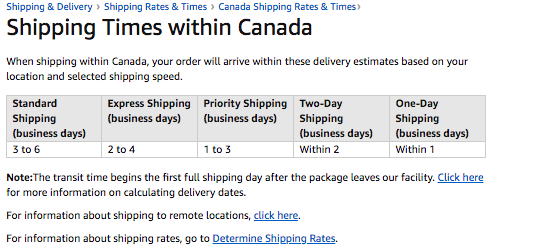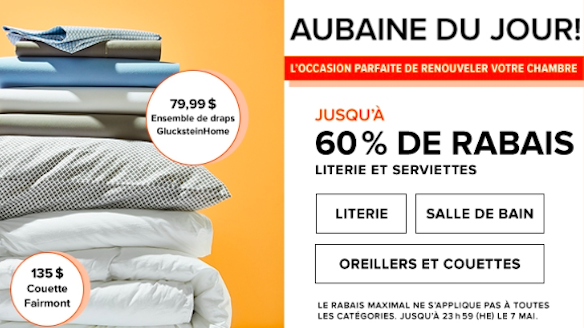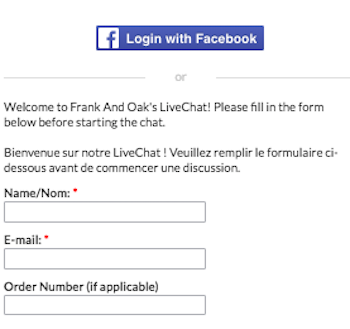The cohesion between online and offline commerce is an issue that companies will have to face, otherwise they will perish compared to those which have been able to evolve with technology. According to a study conducted by Cefrio, nearly six out of ten Quebecers made one or more purchases online in 2017. The latter spent an average of $863 there during the same year. And those who don't buy online go there for information and then buy in store.
In such a context of competitiveness, how can we deal with giants like Amazon, which benefits from economies of scale allowing products to be offered at very low prices? The implementation of certain success factors in online commerce will allow you to meet and even exceed the expectations of your customers who are more and more demanding. This satisfaction will thereby help to maintain and increase your market share.
Without further ado, let's find out about these key success factors!
Online Commerce: The Essentials for Success
1.Develop a Delivery Strategy
Focus on shipping costs
The concept of delivery costs is a major element that you should consider before launching into e-commerce! No matter how wonderful your transactional site is, excessively high shipping costs will deter some individuals from completing their transaction. In this sense, we want to minimize the irritants that impact the average rate of cart abandonment. Of course, free shipping is a very attractive asset for consumers, but think about how you will be able to offer this possibility to your customers! If you are selling luxury goods, you could potentially include shipping costs in the price of the product to give the perception of free shipping. Alternatively, you could just display the shipping price your shipping company charges you for getting the products to customers. It's up to you to see which option suits you best! No matter what options you offer to your customers, it can be interesting to present different delivery options, costs and times in the table form like Amazon has done in the table below.

Source : Amazon
Minimize Delivery Times
For a consumer, what could be more annoying than receiving a product at a later date than the one promised for purchase? When you promise delivery within 3-7 business days, make sure you can meet that deadline. To do this, it is necessary to minimize your internal delays, i.e. the time during which your packages remain in your warehouse before sending. In addition, it may be interesting to offer the possibility of tracking the package, that is to say to see where the package is delivered. The consumer will therefore have a better idea of when they will receive their purchase, which could avoid possible disappointment!
Provide for Inventory Management and Logistics
To ensure the success of your delivery strategy, you must first have the right resources in place. Indeed, you must have a team that will be in charge of preparing the packages and sending everything to the recipient. Note that it is possible to outsource the delivery, that is to say to use a third party, such as UPS or Canada Post, which will take charge of the delivery of the products. Remember that from a recurrence perspective, for a consumer to want to purchase our products again, we must ensure that we offer a good experience from A to Z.
2.Focus on Evocative Visuals
In online commerce, the visual is an important aspect to consider. A simple low-quality photo can literally deter a consumer from purchasing your products. In terms of photos, the watchword is appealing! The primary objective is to charm your customers with attractive visuals. Consequently, the fact of planning a photo session with professional photographers will contribute to the quality of the visuals put forward. It can also be interesting to have several photos per object, from different angles, which will allow the customer to have an overview of the product. If you work in the clothing and fashion industry, having a size guide could avoid some unpleasant surprises for your customers. After all, sizes vary enormously from brand to brand. This could help decrease return and exchange rates!

Source : Lululemon
3.Keep in Mind that this is Continuous and Daily Work
Online commerce requires a lot of effort on a daily basis. You have to do follow-ups, prepare orders, coordinate returns, etc. It is an ongoing process that requires being on the lookout for the needs of customers. Most importantly, remember that it does not end once the product has been shipped. After sending a product, it's time to measure the satisfaction of your customers to ensure their loyalty. Is the customer satisfied with the delivery times, the condition of the product received? This dialogue with the target is inevitable to ensure the success of your transactional website! Nowadays, with reviews, a bad experience spreads in a fraction of a second and can destroy a reputation ... Think about it!
4.Use Discount Advertisement Sparingly
Posting discounts is a double-edged sword when it comes to online business. Your customers will certainly appreciate benefiting from a rebate coupon at the time of purchase. However, if week after week your entire online store is on promotion, it could damage the perceived value and image of your brand. Keep in mind that it is good to have certain featured products on promotion, but too many discounts can be bad for your business reputation. Think about it! In the future, why would a customer buy a product from you at full price when he knows full well that it will go down in price the following week? In the long run, such thinking from your customers could affect your sales. As in many areas, when it comes to promotion, too much is like not enough! However, you have to keep in mind the purpose of your business. The primary purpose of your website is likely to be to offer products at a discount. In this particular case, your goal will not be to increase the perceived value of your products, which will be justified!

Source : La Baie d'hudson
5.Customize the Sale
Personalization is a differentiator that helps a customer feel challenged by your offer. Always keep your personas in mind when setting up initiatives. To this end, according to Cefrio, criteria linked to age and income are the most decisive in terms of buyer behavior. You should therefore keep these factors in mind when it comes time to reach your targets.
In addition to customizing your audience, it's a good idea to tailor your initiatives to seasonality and current holidays. If you know that there are only 24 hours left before you can guarantee delivery before December 24th, create a dynamic countdown. These are small elements that can make all the difference, we assure you. For example, Bijouteries Lavigueur has been able to promote Mother's Day to promote the sale of its products.

Source : Bijouteries Lavigueur
6.Ensure the Security of the Purchasing Process
Did you know that security is a key aspect to promote conversion on your transactional site? There are certain things that can make the difference in making the people browsing your site feel safe. For example, the little padlock to the left of the URL lets Internet users know that this is a secure website. The higher the value of a product, the more reluctant the notion of risk associated with the purchase can make an individual. To reassure your customers, you could also set up an online chat, which will allow an individual to ask a customer service member any questions they seem to be missing, to make an informed choice. Frank and Oak is a company known for its impeccable customer service. You will therefore not be surprised to learn that the company has a live chat available on its home page!

Source : Frank and Oak
7.Make Sure you are Found on Search Engines
The SEO optimization of your transactional website is essential to increase your sales. Each of your product pages must be positioned around a keyword that is sought by your persona. It is in finding your site in the search results that Internet users will be able to be converted. When it comes to keywords, it is best to opt for long-tail keywords, which are two to three word keywords, since you will reach a more qualified audience. For example, if you position yourself on the word ‘’evening shoes’’, you will have a better chance of making a sale with the individual with that search intent, as opposed to someone who searched for sneakers by positioning yourself with simply the word shoes.

8.Offer a Simple Platform Adapted to the Needs of your Personas
Subsequently, to increase the conversion rate on your transactional site, the ease of navigation on your site is a major issue. Your visitors need to find the information they are looking for quickly, otherwise they will buy from a competitor's website. The concepts of UX (User experience) and CX (customer experience) must be mastered. Favor a simple and intuitive menu that will effectively guide the Internet user during his visit to your site!
9.Understand the Importance of the Buyer's Journey
As shown in the image below, the online shopping/buying process begins long before the purchase decision stage! For an individual to convert, you have to make sure you offer them content and offers at each stage of the decision-making process. At the awareness stage, you must allow your visitor to identify the source of their problem, which will allow you to establish your credibility with them. Then, at the consideration stage, your potential buyers consider several alternatives to resolve their problem. You should therefore offer them content with several alternatives, including your product that can be found on your transactional site. Therefore, we must offer content that will allow your target to decide on one of the alternatives, which is (ideally) yours. In this sense, your content must clearly demonstrate why your products perform better than others. Then, at the post-purchase evaluation, it is necessary to ensure customer loyalty so that the latter eventually buys on the site. After a first purchase, this is the perfect opportunity to offer products and services that are complementary to the initial purchase! To do this, a good emailing strategy can be very beneficial!
10.Observe what the Competition is Doing on the Web
When focusing on your business competition, it's important not to limit yourself to the physical competitors in your business. A brand located in another country may be your biggest opponent. Sometimes just seeing what your opponents are up to can inspire you, but more importantly, make you stand out! By visiting your transactional website, the Internet user should quickly grasp the added value of buying from you rather than from your opponent.
11.Insert your E-commerce Strategy in an Omnichannel Sales Context
Nowadays, the buying process is, for the most part, the result of a hybrid combination of “online” and “offline”. Sometimes consumers see a product online and drop by to see it in store. Other times, they buy a product in a store that they have seen online. In this sense, it is important to integrate this reality into your online and offline store. Online, this can result in a store locator where a certain product can be found. In stores, it may be interesting to present electronic tablets to offer the possibility of obtaining the desired product in a specific color, for example.
Overall, the purchasing process takes place in stores, on the website, on social media and via emailing. Keep in mind that consistency across your different platforms is of utmost importance. If your points of sale are in poor condition, no matter how beautiful your website is, it could be damaging to your reputation!
12.Offer a Simplified Purchasing Process
To increase your conversion rate on your e-commerce site, it is essential to streamline your purchasing process so that everything becomes simple for your visitors. Sometimes, if a user sees that there are a multitude of fields to fill out to complete a purchase, the visitor can quickly become discouraged. It is therefore a good idea to offer the option of purchasing as a guest, thus minimizing the number of questions asked of the buyer. Rather, we limit ourselves to the necessary elements, such as the method of payment, name and address.
In addition, the optimization of your e-commerce site for mobile (m-commerce) is now an inevitable factor, since many individuals make purchases on their cellphones. In addition to m-commerce and voice commerce, voice commerce, will take homes by storm over the next few years. Available on platforms such as Amazon's Alexa and Google Home, individuals will be able to purchase your favorite products via voice command. Simple as everything, isn't it? With a simple voice command, consumers' desires will be fulfilled! It will therefore be necessary to carefully study consumers' intentions for voice searches in order to simplify the purchasing process via voice commerce. The simple fact of waiting before you take an interest in it could be very detrimental to you ... We do not want you to miss the boat!

Source : The Next Web
Sure, online business is here to stay. However, it will take many forms over the next few years and will continue to be refined to meet the needs and requests of consumers. And we dare to bet that to promote sales on this technology, the study of vocal search intentions from a v-commerce perspective will be very extensive!
Do you dare try it?






